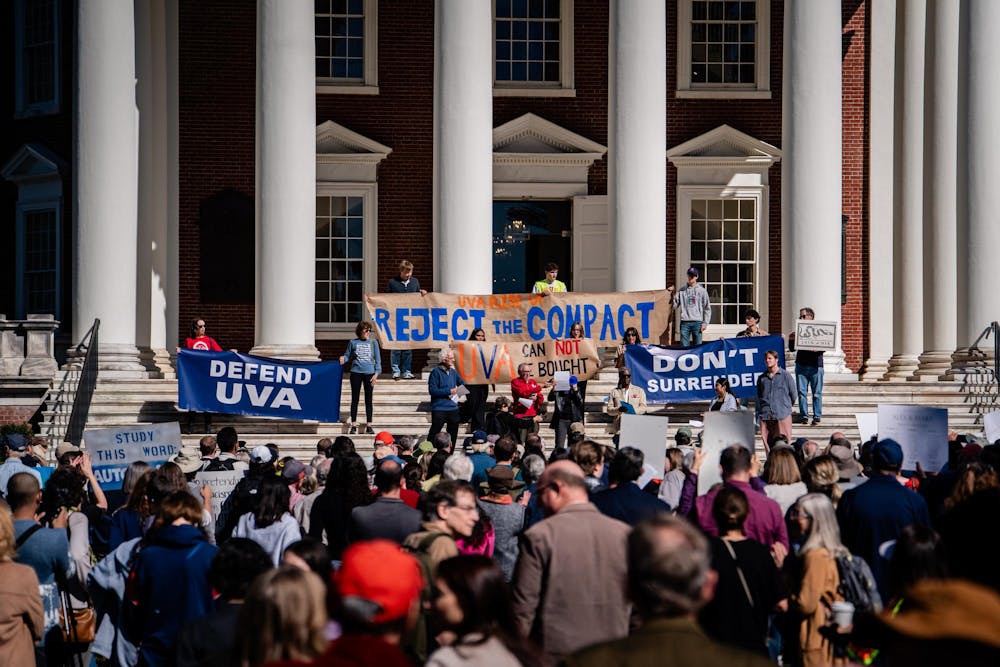In recent months, “viewpoint diversity” has become a guiding phrase in the lexicon of academic governance. The term is seemingly innocuous — it appears to be a celebration of diversity of thought in higher education. But this interpretation has grown increasingly unstable. In fact, recently, “viewpoint diversity” has been warped into a political mandate to impose ideological balance through administrative control.
The rhetoric of viewpoint diversity materialized at the University in April when the Board of Visitors voted in a closed session to reverse its prior commitment to fulfill numerical racial diversity goals and committed instead to strengthening viewpoint diversity. This resolution created a troubling link between viewpoint diversity and the elimination of programs advancing racial equity. These conflations of equity with bias and balance with control have far-reaching implications.
These concerns became even more visible this fall. Last month, the University was named among nine institutions offered preferential federal funding through the Trump administration’s “Compact for Academic Excellence in Higher Education.” Notably, the Compact included a section advancing a “Marketplace of Ideas & Civil Discourse,” which required that “institutional units” that punish, demean or incite hostility against conservative viewpoints be altered or eliminated. In the name of viewpoint diversity, it sought not the expansion of discourse, but its regulation. Though this Compact has since been rejected, the University has now signed an alternative deal with the federal government, and in doing so, agreed to protect academic freedom on Grounds.
Despite the agreement protecting academic freedom, language ostensibly promoting open discourse has become a tool for delegitimizing higher education, not only at our University but across the country also. Accusations of strict ideological uniformity have immense potential to mark universities as radical and destabilizing, and thus, in need of government intervention. To the detriment of academic freedom and independence, the contradictory rhetoric of government intervention to safeguard viewpoint diversity is increasingly being invoked across the nation.
This development raises serious concerns. Framing university classes and culture as biased and thus illegitimate reflects a deliberate attempt to inhibit higher education’s primary function of advancing knowledge and critical inquiry. Under the guise of balance, systematic erasure is made to appear restorative and just. While the University has reaffirmed its commitment to academic freedom, it should not deem itself immune to the lure of viewpoint diversity rhetoric. This rhetoric has spread beyond policy into student politics, where appeals to ideological balance have been invoked to justify calls for oversight.
Following the abhorrent assassination of political activist Charlie Kirk Sept. 10, the University’s College Republicans released a letter requesting that, to protect free speech on Grounds, those who reacted positively to his death “be held accountable” by Interim University President Paul Mahoney and the Board. The statement may not have stemmed from ill intent, but its underlying logic poses a serious threat. Hypocritically, the letter called for oversight and consequences to protect free speech — it cited the very familiar rhetoric of balance to rationalize surveillance. Repeated enough, the narrative of an intolerant and uniform political culture invites those who seek to impose ideological balance through suppression to do so.
The irony, of course, is that this rhetoric is selectively invoked to silence progressive perspectives in favor of conservative ones, and it relies on the assumption that universities’ political cultures are manufactured, rather than naturally occurring. While it is true that elite American universities tend to lean liberal, it is disingenuous to assume that this is a result of indoctrination or assert that hostility is a necessary byproduct.
Universities have long served as sites of political movements, debate and inquiry into the systems and institutions that shape the world around us — a tradition that inevitably unsettles power. Further, the University houses a number of programs dedicated to uniting individuals across the political spectrum, from the Karsh Institute of Democracy’s Civic Cornerstone Fellowship to the student-run Civil Discourse Initiative, each offering opportunities for students with varying backgrounds and perspectives to meet, debate and better understand one another.
Any state-imposed effort to make universities more ideologically balanced would necessitate the erosion of academic independence, the abolition or alteration of various academic programs and perhaps a superbly ironic form of DEI that utilizes political criteria to select hirees.
The end result of this rhetoric of balance is its opposite — it seeks to delimit acceptable fields of study and modes of speech and establish a pretext for government intervention. For students, faculty and staff on Grounds, these developments are not merely abstract. We are witnessing, in real time, how external oversight can shape University governance, and we should pay special attention to the language being employed to this end. After all, rhetoric is always political.
Grace Clippinger is a viewpoint writer who writes about politics for The Cavalier Daily. She can be reached at opinion@cavalierdaily.com.
The opinions represented in this column are not necessarily those of The Cavalier Daily. Columns represent the views of the authors alone.







